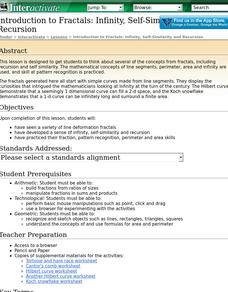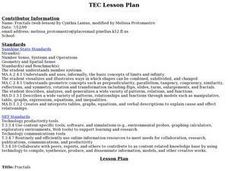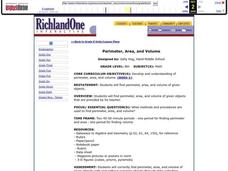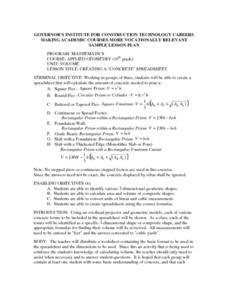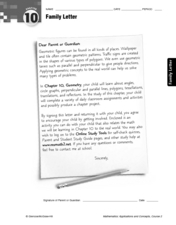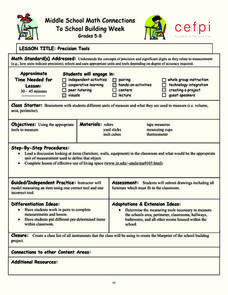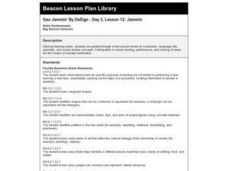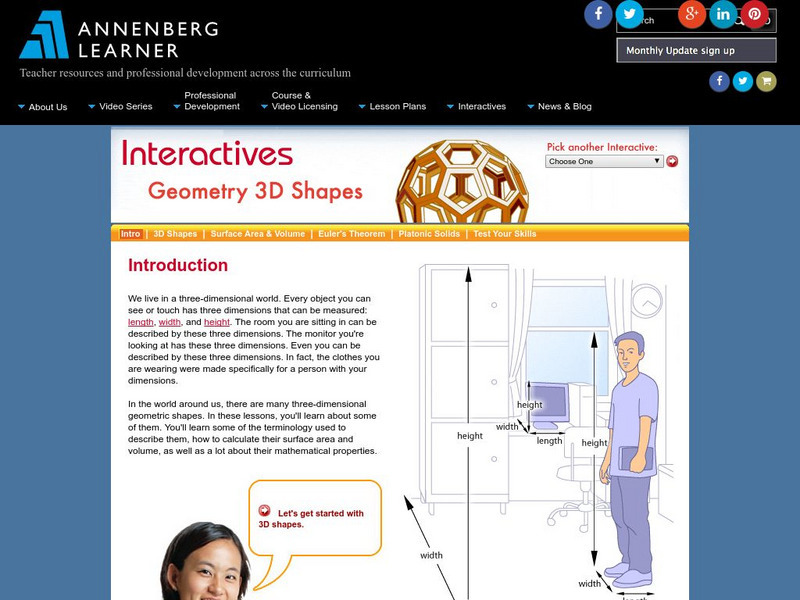Curated OER
Introduction to Fractals: Infinity, Self-Similarity and Recursion.
This lesson introduces students to the ideas involved in understanding fractals. They develop a sense of infinity, self-similarity and recursion and
Curated OER
What are Fractals?
Middle and high schoolers identify and analyze fractals and research information using the Internet to locate information about them. They look at fractals in relation to nature and other real world situations. Pupils create several...
Curated OER
Faces of a Cube
Students identify and correctly name three-dimensional solids; cones, spheres, and cubes. In this three-dimensional figures lesson, students build a cube by matching colored square faces to a correct word. Students then...
Curated OER
Perimeter, Area and Volume
Young scholars compute area. In this perimeter, area and volume lesson plan, students examine given objects and determine the perimeter, area, and volume of each.
Curated OER
Grade 3 Math Practice
In this grade 3 math worksheet, students complete a total of 10 questions that use a variety of grade 3 concepts. Page is part of a site with links.
Curated OER
The Circle's Measure
Students explore circumference and diameter. For this math lesson, students apply their knowledge of circumference and diameter to solve mathematical riddles. Students apply this knowledge to find circumference and diameter of various...
Curated OER
Building Homes
Students investigate architecture and construction by building a home from cardboard tubes. In this housing lesson, students collaborate in groups to plan and create buildings they can fit in made from cardboard tubes, newspaper...
Curated OER
Creating a "Concrete" Spreadsheet
Students create a spreadsheet that calculate the amount of concrete needed to pour various concrete forms.
Curated OER
Family Activity: Triangles and Quadrilaterals
In this triangles and quadrilaterals worksheet, students solve 7 short answer problems. Students find objects around the house that are constructed from triangles, parallelograms, trapezoids, squares, rectangles. Students sketch the...
Curated OER
Molecular Modeling Activity
Students explore the concept of molecular modeling and differentiate between saturated and unsaturated compounds. In small groups, they identify molecular formulas, complete a chart comparing alkanes, alkenes, and alkynes, and construct...
Curated OER
Effect on Surface Area and Volume
Students identify the effect the change of dimensions causes for the volume and surface area. In this geometry instructional activity, students compare perimeter, area and volume as they play around with the dimensions of the...
Curated OER
Introduction to Fractals: Infinity, Self-Similarity and Recursion
High schoolers think about several of the concepts from fractals, including recursion and self similarity. They use mathematical concepts of line segments, perimeter, area and infinity are used, and skill at pattern recognition is...
Curated OER
Precision Tools
Students discuss the appropriateness of using a specific tool to measure and define an object. After measuring the area of their classroom and the objects in it with the appropriate tools, they create a floor plan that makes the most...
Curated OER
Geo Jammin' By DeSign - Day 3, Lesson 12: Jammin
Students review definitions of word wall words using songs, movement and sharing.
Curated OER
Angles and Parallel Lines
Sixth graders draw parallel and intersecting lines to observe and examine the characteristics of alternate interior angles, vertical angles, corresponding angles, and supplementary angles. Through observation, they discover the...
Math Is Fun
Math Is Fun: Regular 2 D Shapes
This tutorial provides illustrations for regular 2-D shapes as well as a definition for polygons and for regular polygons.
Annenberg Foundation
Annenberg Learner: Geometry: 3 D Shapes: Surface Area and Volume
Learn how to calculate the surface area and volume of rectangular prisms and cylinders. Four interactive animations, preceded by simple instructions, guide you through the process of calculating area and volume.
E-learning for Kids
E Learning for Kids: Math: Music: 2 D Shapes
Kyan is an African villager. Can you help him name and define different parts of shapes?
Annenberg Foundation
Annenberg Learner: Geometry 3 D Shapes: Polyhedra, Prisms, and Pyramids
An introduction to a type of three-dimensional shape called a polyhedron. See examples and play with an interactive animation, showing the faces, vertices, and edges of pyramids, which are a type of polyhedron.
Annenberg Foundation
Annenberg Learner: Geometry 3 D Shapes
Learn about several three-dimensional geometric shapes and the terminology used to describe them. Learn how to calculate their surface area and volume, and explore their mathematical properties.
NumberNut
Number Nut: Shapes, Symbols, and Colors: 2 D Shapes
Did you know that two-dimensional shapes are also called polygons? This lesson describes the various 2-D shapes and includes two interactive games to reinforce skills.
Cuemath
Cuemath: 3 D Shapes
Introduces the concept of 3D shapes by learning the definition, types, properties, and three dimensions. Check-out the solved examples for better understanding and try your hand at solving a few interactive questions at the end of the page.
E-learning for Kids
E Learning for Kids: Math: Great Barrier Reef: Shapes: 3 D Objects & Position
Join Mel and Alba and find out more about 3D shapes and the position of objects.
ClassFlow
Class Flow: 3 D Shapes
[Free Registration/Login Required] In this flipchart, students are introduced to the following 3-D shapes, including spheres, cylinders, and rectangular prisms.
